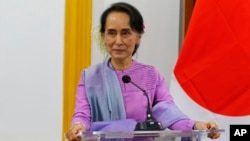Myanmar’s top business leaders have rallied behind State Counselor Aung San Kyi’s plan for Rakhine State, expending money and resources on frontline efforts to resettle refugees and rebuild infrastructure.
A government agency chaired by the country’s de facto leader is also wooing private capital into an area cleared of a substantial portion of its people. Rohingya militant attacks on police posts in August provoked a military sweep driving more than 650,000 Rohingya into Bangladesh.
In an e-mailed statement to VOA, the United Nations High Commissioner for Refugees said, “conditions in Rakhine State are not yet fully conducive to the safe and sustainable return of refugees.”
The repatriations have been put on hold and Rohingya community leaders have demanded the restitution of community land, legal redress for atrocities, and a path to citizenship as essential preconditions.
While Myanmar’s civilian government, led by Aung San Suu Kyi’s National League for Democracy (NLD), is constitutionally barred from holding the army to account, it has tried to take control in other ways, chiefly via the Union Enterprise for Humanitarian Assistance, Resettlement and Development in Rakhine, or UEHRD. It was formed in October to mobilize Myanmar society in a shared patriotic venture.
Roads and fences
Pivotal to the vision is the support of Myanmar’s tycoons—the dozen or so business leaders who made fortunes during military rule and continue to dominate the economy through privately owned, highly diversified conglomerates.
They were quick to oblige. A UEHRD ceremony held in the capital, Naypyidaw, in October drew close to $13.5 million from a roster of well-known company chairmen: Aung Ko Win of KBZ, Zaw Zaw of Max Myanmar, Steven Law of Asia World, Chit Khine of Eden, and Khin Shwe of Zaykabar, among others.
Nyo Myint, senior managing director of KBZ Group, told VOA some of the $2.2 million donated via its charitable arm, the Brighter Future Foundation, would be spent on a new fence across a stretch of the border with Bangladesh. He said this would benefit “both countries” in deterring illegal migration, a supposed conflict trigger.
Other support has been more direct. Chit Khine, the Eden Group chairman, told VOA over the phone that his company—which constructed substantial parts of Naypyidaw, launched as Myanmar’s new capital in 2005—was now helping build structures in Nga Khu Ya, one of two processing sites for returning refugees established near the border.
In early January, Myanmar state media ran a press release from Asia World, Myanmar’s largest conglomerate. It depicted a “non-for-profit” 80-kilometer road in northern Rakhine State built under the banner of its own charitable foundation—a “proud” effort undertaken as part of UEHRD’s construction taskforce.
The thaw
The heads of Eden, KBZ, and Asia World were previously under Western sanctions for their alleged links with the former military junta. Their prominence in Aung San Suu Kyi’s plan marks a broader rapprochement between the former dissident leader and the tycoons whom, during her years of house arrest, she lambasted as military “cronies.”
The thaw began early in her government tenure. In an October 2016 event for top taxpayers, she told assembled tycoons she wouldn’t dwell on past misdeeds but asked for, “those who have previously worked for their own self-interest work for others in the future.”
Gerard McCarthy, associate director of the Myanmar Research Center at the Australian National University, told VOA that enlisting the support of tycoons for national causes is not a departure from core NLD values, which center on “a morally virtuous project,” defined by individual acts of merit. Under this ethos, he said, “capitalists can be moral as long as they contribute.”
But Aung San Suu Kyi’s public-private fix for Rakhine State doesn’t stop at charity. It also involves presenting Rakhine State as a promising business opportunity in answer to a recommendation by the Advisory Commission led by former U.N. Secretary-General Kofi Annan for increased, albeit responsible, investment in one of Myanmar’s poorest states.
Former glories
To spur private sector interest, the government in October rebooted a stalled economic zone, with a focus on trade facilities, in Maungdaw in northern Rakhine State, by signing a memorandum of understanding with a consortium of local and Yangon-based firms.
The Union of Myanmar Federation of Chambers of Commerce and Industry (UMFCCI) is coordinating a private sector investment drive in Rakhine, on behalf of UEHRD, covering sectors ranging from agriculture to micro-finance to tourism.
Ye Min Aung, vice chair of the UMFCCI and secretary-general of Myanmar Rice Federation, told VOA, “Some people, they don’t want to donate, but they want to invest.”
“The root of all the problems in Rakhine is the desperate economic situation,” he said, adding they would promote “agribusiness for peace” by establishing a new firm, the Rakhine Agribusiness Public Company, which would eventually trade on the Yangon Stock Exchange.
He said he was lobbying the government to offer more concrete incentives for investors.
Patriotic duty
Vicky Bowman, director of the Myanmar Center for Responsible Business, told VOA via email that while humanitarian needs should come first, there was “a need for public investment in infrastructure to combat Rakhine’s isolation and associated poverty.” She added, “the private sector may be a suitable partner.”
However, among other risks, Bowman noted “local resentment that businesses from outside of Rakhine have had more opportunity than locals.” The entry of major conglomerates could foment tensions at a time of heightened Rakhine nationalism.
On January 16, the local government’s banning of a ceremony commemorating the 1784 fall of the Rakhine kingdom to the Burmese, led to deadly confrontations between the police and thousands of angry locals in the town of Mrauk-U.
Yet, both Ye Min Aung of UMFCCI and Nyo Myint of KBZ described their efforts in terms of patriotic duty. “This is the time the Myanmar private sector should be united to show solidarity under the leadership of the present government,” said Ye Min Aung.




